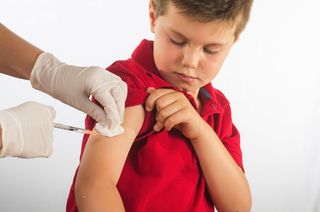Vaccine Refusal Contributes to Whooping Cough Outbreaks

The 2010 whooping cough outbreak in California may have been fueled, at least in part, by clusters of parents who refused to vaccinate their children, a new study suggests.
Researchers analyzed local rates of children entering kindergarten with "non-medical" vaccine exemptions, meaning parents or guardians applied for an exemption from school policies requiring vaccines due to personal beliefs, rather than for medical reasons. They compared these rates with rates of whooping cough in 2010, the year the state experienced a whooping cough outbreak that caused 9,120 cases and 10 deaths from the disease.
The researchers identified 39 areas, or clusters, with high rates of non-medical exemptions, as well as two large clusters of whooping cough (also called pertussis) cases.
More cases of pertussis occurred within the exemption clusters than outside of the clusters, the study found. [7 Devastating Infectious Diseases]
In addition, areas within exemption clusters were more than twice as likely to overlap with pertussis case clusters than areas outside of exemption clusters.
The results held even after the researchers took into account factors that could affect disease rates, such as population density.
San Diego County had a particularly high degree of overlap between clusters of exemptions and pertussis cases. There were 980 pertussis cases in the county, and the area in and around Escondido, a city in San Diego County, had more than 5,100 exemptions.
Sign up for the Live Science daily newsletter now
Get the world’s most fascinating discoveries delivered straight to your inbox.
Many factors likely contributed to the 2010 California pertussis outbreak, including increased detection of cases, the fact that pertussis activity increases and decreases in cycles, and that protection offered by a new version of the pertussis vaccine wanes more quickly than that of the previous vaccine.
But the new findings suggest that vaccine refusal played a role as well, the researchers said. Although the overall rate of vaccination in California remained high (90 percent of kindergartners in 2010 were fully vaccinated), some regions had lower immunization rates, the researchers said. In 2010, some schools reported non-medical exemption rates as high as 84 percent.
"Our findings suggest that communities with large numbers of intentionally unvaccinated or undervaccinated persons can lead to pertussis outbreaks," the researchers wrote in the Sept. 30 issue of the journal Pediatrics.
"In the presence of limited vaccine effectiveness and waning immunity, sustained community level transmission can occur, putting those who are most susceptible to communicable diseases, such as young infants, at increased risk," said the researchers, from Johns Hopkins Bloomberg School of Public Health, Emory University School of Public Health and the California Department of Public Health.
The researchers noted that non-medical exemptions for kindergartners are only a proxy for community level vaccination coverage. Future research should study how vaccine refusal contributes to pertussis outbreaks, the researchers said.
Another study published earlier this month found that young children who miss some of their whooping cough shots, or receive the shots late, are at increased risk for catching the disease.
Follow Rachael Rettner @RachaelRettner. Follow LiveScience @livescience, Facebook & Google+. Original article on LiveScience.

Rachael is a Live Science contributor, and was a former channel editor and senior writer for Live Science between 2010 and 2022. She has a master's degree in journalism from New York University's Science, Health and Environmental Reporting Program. She also holds a B.S. in molecular biology and an M.S. in biology from the University of California, San Diego. Her work has appeared in Scienceline, The Washington Post and Scientific American.